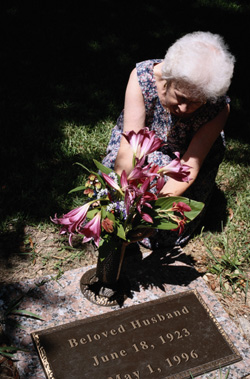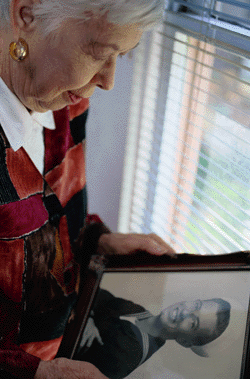By CYN LoPINTO
Editor-in-chief, gerontologist
 Loss is a necessary and inevitable part of our existence. Most of us will experience the death of someone close to us at some point in our life. While it is both frightening and painful, it may also be an opportunity for personal growth. According to J.W. Worden’s classic 1982 book, Grief Counseling and Grief Therapy, there are essentially four tasks that need to be accomplished to successfully move through the grieving process.
Loss is a necessary and inevitable part of our existence. Most of us will experience the death of someone close to us at some point in our life. While it is both frightening and painful, it may also be an opportunity for personal growth. According to J.W. Worden’s classic 1982 book, Grief Counseling and Grief Therapy, there are essentially four tasks that need to be accomplished to successfully move through the grieving process.
The first task is that the person grieving needs to accept the reality of the loss. They must acknowledge that the death in fact has occurred. If this doesn’t happen, this individual can expect to experience prolonged grief.
The second task is to realize that grief is painful. Unfortunately, there is no way around this. Anger, disbelief, despair and guilt are just some of the feelings that a person who has suffered a loss may be experiencing. If you are going through this difficult time, give yourself permission to feel whatever it is that is going on inside of you. You can’t rush feelings, you can only try to understand them. Many are tempted to use alcohol and drugs to help ease this pain, but such substances will only mask emotions, not erase them. Also be aware of any other “avoidance” behavior such as intense preoccupation with work. This will only delay the process.
The third task for the grieving person is to adjust to an environment that no longer includes the person who has died. This may seem unimaginable and this period is often a scary time. It is especially hard if you have been dependent on your loved one for many things and now they are gone. You may have to learn some new skills and take on added responsibilities to get your life back in order. It often helps to be with other people who are going through the same adjustment period. Most cities have grief support groups and programs that offer classes on life-skill activities such as bookkeeping, cooking and auto maintenance. Sometimes the fear itself of learning something new is the worst of it. Facing this fear and accomplishing something you never thought you could, will give you the confidence you need to get back on the road to healing.
 The fourth task is the most time consuming of them all. Here the grieving person needs to learn how to take the emotional energy that was being spent on the deceased person, and use this energy to invest in new relationships. This does not mean “forgetting ” the person who has died. It means keeping their memory alive, while starting some new friendships. There may be some feelings of guilt that occur during this period, as it may seem like a form of betrayal to the person who is gone. It really is a tribute to their memory. They would want you to get on with your life and be happy.
The fourth task is the most time consuming of them all. Here the grieving person needs to learn how to take the emotional energy that was being spent on the deceased person, and use this energy to invest in new relationships. This does not mean “forgetting ” the person who has died. It means keeping their memory alive, while starting some new friendships. There may be some feelings of guilt that occur during this period, as it may seem like a form of betrayal to the person who is gone. It really is a tribute to their memory. They would want you to get on with your life and be happy.
There is no “correct” way to grieve. Each of us will react differently when faced with loss. The time it takes to move through the grieving process varies with the individual as well. Give yourself a break here. Well-meaning friends and family may try to push you through your grief. You may also hear comments on where you “should” be in your journey. Only you know when you are ready to move on. Those who are close to you may say the wrong thing because of their own discomfort with seeing someone they care about in such pain. There is an overwhelming feeling of helplessness for many people when they are around someone who is grieving. They don’t know what to do.
If you are dealing with a loss, make it a priority to take care of yourself. Grieving takes an awful lot of energy and can really drain the body both physically and emotionally. Re-fuel yourself by eating properly and getting plenty of rest. Many find that going outside and being in nature helps to relax them. Check with your doctor about an exercise program too. This could help to relieve your stress level.
Isolation is something you need to avoid when suffering a loss such as the death of a loved one. While it is a normal reaction to want to shut yourself off from the rest of the world, it could do more harm than good. Try to be around people that care about you and with whom you are comfortable. Communicate your feelings, but keep in mind that others may find it hard to help you with your grief. They may be dealing with loss issues of their own and aren’t able to offer their friendship during this time. Death is a subject many have trouble with. Realize that this is not intentional.
Cynthia Lopinto
Latest posts by Cynthia Lopinto (see all)
- Honey Chocolate–Covered Pretzels - April 3, 2018
- True Colors - April 3, 2018
- Spring Cleaning…You’ve Gotta Be Kidding - April 2, 2018
- Should You Stay In Your Home Or Move During Retirement? - April 2, 2018
- Hawaiian Plants For Good Health - April 2, 2018
 Home Front Magazine A Publication for Seniors
Home Front Magazine A Publication for Seniors

